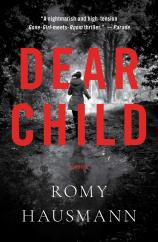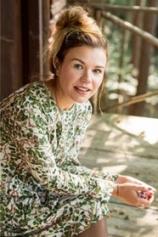Excerpt
Excerpt
Dear Child

THE NIGHT OF THE ACCIDENT
HANNAH
It’s easy to begin with. I straighten my back and take a deep breath. I climb into the ambulance and travel with it. I tell the men in the orange coats Mama’s name and that her blood group is AB negative. AB negative is the rarest blood group and it doesn’t have any antibodies against groups A and B. That means Mama can have blood from all the other groups. I know this because we talked about blood groups in class. And because it’s in the thick book. I think I’ve done everything right. It’s only when I unintentionally think about my brother that my right knee starts trembling. Jonathan will be frightened without me.
Concentrate, Hannah. You’re a big girl now.
No, today I’m a little girl and I’m stupid. It’s cold, it’s too bright and it’s beeping. I ask where the beeping’s coming from, and one of the men in the orange coats says, “That’s your mom’s heart.”
My mom’s heart never beeped before.
Concentrate, Hannah.
It’s a bumpy ride and I close my eyes. Mama’s heart is beeping.
She screamed and there was a bang. If my mum’s heart stops beeping now, those will have been the last sounds I heard her make: a scream and a bang. And she didn’t even wish me goodnight.
The ambulance does a little jump then comes to a stop.
“We’re here,” the man says. He means at the hospital.
A hospital is a building where illnesses or injuries are treated with medical assistance.
“Come on, little girl,” the man says.
My legs move automatically and so quickly that I can’t count the steps. I follow the men pushing the rattling stretcher on wheels through a large glass door beneath the glaring sign that says “Accident and Emergency,” and then down a long corridor. As if by command, helpers swarm from both sides and lots of voices all talk nervily at the same time.
“You can’t come in here,” a fat man in a green apron says, nudging me to the side when we arrive at another large door at the end of the long corridor. “We’ll send someone to look after you.” He points at a row of seats along the wall. “Go and sit down there for the moment.”
I want to say something, but the words won’t come out, and in any case the man has already turned around and disappeared through the door with the other helpers. I count the chairs along the wall—seven. He—the fat man in the green apron—didn’t say which one I should sit on. I’ve started chewing my thumbnail without realizing it. Concentrate, Hannah. You’re a big girl now.
I sit with my knees up on the middle chair, picking pine needles and small brown bits of bark from my dress. I got quite dirty this evening. I think of Jonathan again. Poor little Jonathan who stayed at home and has to do the cleaning. I imagine him crying because he doesn’t know how to get rid of the stains from the carpet in the sitting room. I’m sure we’ve got the right cleaning fluid in the store cupboard, but Papa’s put two padlocks on the door. A precautionary measure. We need to have lots of these. You always have to be careful.
“Hello?” A woman’s voice.
I leap to my feet.
“I’m Sister Ruth,” the woman says with a smile, and takes my hand to shake it. I tell her my name is Hannah and that it’s a palindrome. A palindrome is a word that reads the same forward as well as backward. To prove it I spell my name, first from the beginning and then from the end. Sister Ruth is still smiling and says, “I understand.”
She’s older than Mama; she’s already got gray hair and she’s slightly round. Over her light yellow apron she wears a colorful cardigan which looks nice and warm and has a sticker with the face of a panda on it. It says, “Be Happy.” That’s English. The corners of my mouth twitch.
“You haven’t got any shoes on, child,” Sister Ruth remarks, and I wiggle the big toe of my left foot through the hole in my tights. Mama stitched it up on one of her good days. I bet she’d be angry if she knew that I’d made the hole in my tights again.
Sister Ruth takes a tissue from the pocket of her apron because she thinks I’m crying. Because of the hole in my tights or because of Mama. I don’t tell her it’s actually because I’m blinded by the harsh light from the fluorescent tube on the ceiling. I just say, “Thank you, that’s very considerate.” You always have to be polite. You always have to say please and thank you. My brother and I always say thank you when Mama gives us a cereal bar, even though we can’t stand cereal bars. We don’t like the taste. But they’re important because of the vitamins. Calcium and potassium and magnesium and Vitamin B for the digestion and blood formation. We eat three of them every day unless we’ve run out. Then we have to hope Papa comes home soon and has been shopping on the way.
I take the tissue, dab my eyes, blow my nose, then give it back to Sister Ruth. You mustn’t keep anything that doesn’t belong to you. That’s stealing. Sister Ruth laughs and puts the tissue back in her apron. Of course I ask her about Mama, but all Sister Ruth says is: “She’s in the best hands.” I know that’s not a proper answer, I’m not stupid.
“When can I see her?” I ask, but don’t get an answer to that either.
Instead Sister Ruth says that she’s going to take me to the staffroom to see whether there’s a pair of slippers I could wear. Jonathan and I have to wear slippers at home too because the floor is very cold, but mostly we forget and our tights get dirty. Then Mama gets cross because it’s not washing day, and Papa gets cross because Mama hasn’t cleaned the floor properly. Cleanliness is important.
The staffroom is big, at least fifty paces from the door to the wall opposite. In the middle are three tables, each of which has four chairs arranged around it. Three fours are twelve. One of the chairs isn’t straight. Someone must have been sitting there and not tidied up when they left. I hope they got into trouble. Because tidiness is important too. The left-hand wall of the room is filled with a metal cupboard with lots of individual lockable compartments, but there are keys sticking out of almost all of them. There’s also a loft bed, which is metal too. Straight ahead are two windows. I can see the night through them. The night is black and there aren’t any stars. To the right is a kitchen unit. There’s even a kettle out on the work surface. Hot water can be very dangerous. Skin burns at one hundred thirteen degrees. At one hundred forty degrees the protein in the skin cells congeals and the cells die off. The water inside a kettle is heated to two hundred twelve degrees. We’ve got a kettle at home too, but we keep it locked away.
“Why don’t you sit down?” Sister Ruth says.
Three fours are twelve. Twelve chairs. I have to think, but I’m distracted by the black night without any stars beyond the windows.
Concentrate, Hannah.
Sister Ruth goes to the cupboard, opens one compartment after another, then closes it again. She says “hmm” a few times, drawing it out, and the metal doors clatter. Looking over her shoulder, she says again, “Come on, child, sit down.”
First I think I ought to go for the chair that’s not straight. But that wouldn’t be right. Everyone needs to tidy up after themselves. Take responsibility. You’re a big girl, Hannah. I nod at nothing in particular and count to myself, eenie, meenie, miney, mo. There’s one chair left over, which would give me a good view of the door and which I’ll put back neatly later when Sister Ruth tells me the time to sit down is over.
“How about these?” she says with a smile, turning to me with a pair of pink rubber shoes. “They’re a bit big, but better than nothing.” She puts them by my feet and waits for me to slip them on.
“Listen, Hannah,” she says as she takes off her cardigan. “Your mom didn’t have a handbag when the accident happened. That means we couldn’t find an identity card or any papers belonging to her.”
Grabbing my arm, she holds it out straight and fiddles the sleeve of her cardigan over my hand.
“So now we don’t have a name or an address. And no emergency contact number either, unfortunately.”
“Her name is Lena,” I say to be helpful, like I was in the ambulance. You always have to be helpful. My brother and I always help Mama when her fingers tremble. Or when she forgets things, like our names or when it’s time to go to the toilet. We go with her to the bathroom so she doesn’t slide off the toilet seat or do anything else silly.
Sister Ruth is now on to the other arm. The warmth that’s still in the cardigan spreads cosily across my back.
“Yes,” she says. “Lena, great. Lena without a surname. The paramedic already made a note of this.” When she sighs I can smell her breath. It smells of toothpaste. She tugs on my chair, which scrapes across the floor, until she can squat in front of me without knocking her head on the edge of the table. Table edges can be very dangerous. Mama often hits her head against the table when she has one of her fits.
Sister Ruth starts fastening the buttons of the cardigan. On my thigh my finger draws the zigzag pattern of her parting. Right, straight, left, straight, left, straight, left again, like a jagged lightning bolt. Sister Ruth suddenly looks up as if she’d sensed me staring at her head.
“Is there anyone we can call, Hannah? Your papa, perhaps? Do you know your telephone number by heart?”
I shake my head.
“But you do have a papa?”
I nod.
“Does he live with you? With you and your mama?”
I nod again.
“Shall we call him? Surely he should know your mama had an accident and that the two of you are in hospital. He’ll be worried if you don’t come home.”
Right, straight. Left, straight, left again, like a jagged lightning bolt.
“Tell me, Hannah, have you ever been to a hospital before? Or your mama? Maybe even this one? Then, you see, we could look in our really smart computer for your telephone number.”
I shake my head.
“In an emergency, open wounds can be sterilized with urine. It disinfects, coagulates the proteins and relieves the pain, full stop.”
Sister Ruth takes my hands. “You know what, Hannah? I’ll make us some tea and then we’ll have a bit of a chat, you and I. How about that?”
“Chat about what?”
Copyright © 2019 by Romy Hausmann
English translation copyright © 2019 by Jamie Bulloch
Dear Child
- Genres: Fiction, Mystery, Psychological Suspense, Psychological Thriller, Suspense, Thriller
- paperback: 368 pages
- Publisher: Flatiron Books
- ISBN-10: 1250768551
- ISBN-13: 9781250768551







